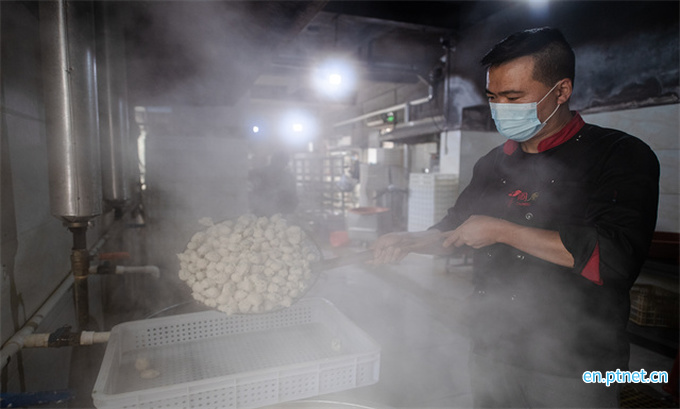A bite of Pingtan: Laosong Fish Ball
en.ptnet.cn | Updated:2021-11-11Every city has its equal share of delectable fares! In Pingtan, one of them comes in a savory bowl of warmth- fish ball soup. A bowl of warm fish ball soup with pickled bamboo relish at Laosong's shall evoke tender feelings of nostalgia for the locals and send your senses reeling for more.

Song Mei, the third-generation successor of Laosong Fish Ball, scoops out cooked fish balls.
Pingtan’s fish balls are known for strict ingredient selection and production. Pingtan Laosong Fish Ball Store, a time-honored store handed down by Song Meizu's ancestors, built a reputation locally. Song Mei, the third-generation successor, turned the business into a brand and applied for the trademark "Song Jin Ji".
Reliving a lifetime tied to the business, Song Mei said it all started a few generations back, from his grandfather and his aunt. Song's grandfather was a village cook. Back then, it was very common to hire a cook over whenever there were any village banquets.
Back then, fish balls were a must-have for banquets. Once a banquet was reserved, Grandpa would make a lot of fish balls. To ensure the taste and freshness, the balls were all handmade on the same day.
Sometime later, things became unstable in the country. No one held a banquet, and the local cooks lost their job. Grandpa started to make fish balls to hawk. “At that time, everyone was poor, and the business was not good. But my grandfather insisted on carrying two baskets of fish balls on a shoulder pole, walking more than an hour from the countryside to the downtown to sell them.” Song Mei said, “For three generations, we have been doing only one thing, making the fish balls for the better.
With Grandpa's perseverance, the fish ball business started to improve, and eventually, it turned from a pole-and-basket business to a brick-and-mortar outlet.
The craft was then passed on to Song Mei’s aunt Song Meihua. Song Mei used to go to his aunt’s house to play when he was little, and every time he saw his aunt making fish balls at home, he would watch it carefully and sometimes help. When Song Mei grew up, he took the “baton”,and made the fish balls with his aunt.
“Making fish balls was all about manual labor, too much for many people. Moreover, many people around also learned to make fish balls, so the business became competitive.” To meet the challenges, Song Mei ventured out to polish the skill, study the trade, and look for machinery.
His efforts had been paid off. Changes had taken place: the manufacturing base was moved to a larger workshop; new equipment was introduced to replace fish grinding by hand, boosting the efficiency; diversified products- there are more than 10 varieties of fish balls now.
The fish ball processing is cumbersome. Selecting the fish, gutting, deboning, mincing, seasoning, pounding, shaping, boiling...every step cannot be ignored. The fish balls are porcelain-white in color, and they are pleasantly chewy and fragrant in the mouth.
In the production process, pounding is the key to making good fish balls. It cannot be replaced by machines. It is also the reason why Laosong Fish Ball is hand-made. "There is still a difference between machine-made and hand-made. This step determines the taste of the fishballs and is the most critical part." Song Mei revealed another secret for his popular fish balls. “Before his death, Grandpa Song Mei enjoined “more fish and less flour”, the principle that Laosong Fish Ball is upheld.
At present, the daily output of Laosong Fish Ball has reached about 1,000 catties, of which 70% of the sales are mainly supplied to local citizens, hotels and supermarkets. Locals who work outside sometimes call to place an order, and Song Mei is responsible for the delivery to appease their homesickness.
Now, Laosong Fish Ball Workshop covers an area of 1,000 square meters. It’s one of the largest workshop in Pingtan with an optimum level of standard practice, and an annual output value of more than 10 million yuan. “We’ll keep our original aspiration of making satisfactory fish balls and inherit the traditional taste amid changing times,” said Song Mei.
Spotted a mistake or want to add something? All rights reserved. Do not reproduce our content without permission–you can contact us directly on our Facebook messenger or Twitter mailbox. Follow @pingtanchina (Facebook/Twitter)

 Fujian Public Security Registration Code: 35012802000271
Fujian Public Security Registration Code: 35012802000271